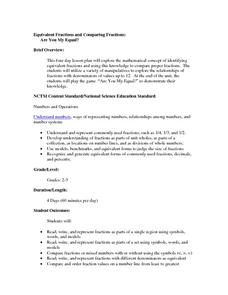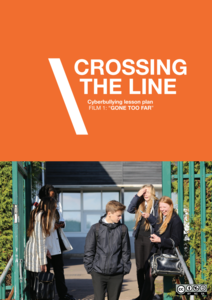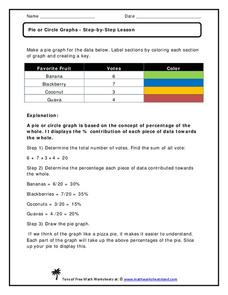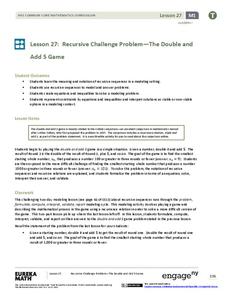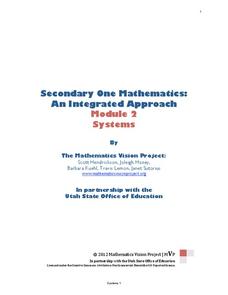Curated OER
Equivalent Fractions and Comparing Fractions
How can you tell if fractions have equal value? Use various collaborative activities to demonstrate the ways to determine whether or not fractions are equivalent.
Childnet International
Crossing the Line: Cyberbullying
Members of the LGBTQ community are more likely to be bullied online than their peers—and bystanders who do nothing can be as problematic as the bullies themselves. Middle schoolers explore ways to protect themselves and others on the...
Math Worksheets Land
Pie or Circle Graphs—Step-by-Step Lesson
How do you display data that you've collected in a pie chart? Follow a clear step-by-step guide to turning survey results into a visible format. It shows kids how to determine the percentage of the whole that each section represents.
Science Matters
Peanut Energy
How do humans get energy since they aren't mechanical and can't photosynthesize? Learners explore this question by relating potential energy in food to human energy levels. Scholars measure the change in mass and a change in...
EngageNY
Solving Percent Problems II
Fill in the blanks to find the best discount! Groups complete a table of amounts and percents associated with sale items. Classmates then find the original cost, sale cost, discount amount, paid percent, or the discount percent...
Curriculum Corner
Root Words
Ten pages offer useful information and five activities designed to reinforce the concept of root words. Scholars make a root word booklet, partake in a matching activity that challenges them to match root words to their...
Code.org
Practice PT - Design a Digital Scene
The final performance task for the unit requires class members to utilize what they have learned to create a personal digital scene. Groups work together to develop a scene and then, using top-down design, break the scene into...
EngageNY
Recursive Challenge Problem—The Double and Add 5 Game
As a continuation of a previous lesson, this activity builds on the concept of calculating the terms of a sequence. Pupils are challenged to determine the smallest starting term to reach a set number by a set number of rounds. Notation...
Give and Let Live
Blood and Transplant: Blood
Why is blood donation so important, anyway? Science and health classes across multiple grades benefit from an in-depth look into the need for and process of blood donation. With an emphasis on presenting the topic in a non-threatening...
Childnet International
Self Esteem
To middle schoolers, there's nothing worse than being excluded from a peer group. Developing important self-esteem skills can not only get them through awkward adolescent times, it can carry them through the rest of their lives as...
California Department of Education
Safe at Work
From minimum wage to minimizing injuries, young workers need to know their rights! The sixth and final lesson in a series of college and career readiness activities gets eighth graders thinking about safety and labor laws.
Huntington Library
Religion & Spirituality - Exploring the California Missions
The California missions were built with the hope of converting the local Native Americans to Catholicism, but exactly how different were their beliefs to begin with? Through analysis of a series of primary source documents,...
Mathematics Vision Project
Module 2: Systems of Equations and Inequalities
The brother-sister pair Carlos and Clarita need your class's help in developing their new pet sitting business. Through a variety of scenarios and concerns presented to the siblings, the learners thoroughly explore systems of equations...
Scholastic
Persausive Writing
A unit on persuasive writing guides elementary learners through the writing process. The first part examines the elements of persuasive writing, including expressing an opinion, connecting ideas, using supporting facts, and writing...
Illustrative Mathematics
Representing Half of a Circle
Geometric shapes make great visual models for introducing young mathematicians to the concept of fractions. Looking at a series of four circles, students are asked to determine whether or not one half of each circle is shaded. To support...
Curated OER
Understanding Symmetry Through Visual Art
Have your class explore symmetry, radial balance and fractional parts in natural and man-made objects in their environment. Learners list examples and identify symmetrical and asymmetrical designs. Pupils are given a box of crayons and...
Charlesbridge
Under the Freedom Tree: A Readers Theater
Susan VanHecke's Under the Freedom Tree is transformed into a 12-part readers theatre script appropriate for a performance by upper-elementary classes.
EngageNY
Equivalent Ratios II
What is the connection between equivalent ratios? Class members first find the multiplication factor used to create equivalent ratios. Next, they take that information to determine whether ratios are equivalent. The second lesson on...
Skyscraper Museum
What is a Skyscraper?
Skyscrapers are amazing feats of architectural design that create the iconic skylines of the world's biggest cities. Young architects explore the defining characteristics of these monstrous towers with the first activity in this...
Huntington Library
Everyday Life - Exploring the California Missions
Young scholars relive history as they examine primary sources that document everyday life in the California missions. During a class viewing of the included slideshow presentation, children analyze documents, paintings, and...
Curated OER
Performance-Based Assessment Practice Test (Grade 4 ELA/Literacy)
Track the progress of your fourth graders' reading and writing skills with this practice Common Core assessment. Based on a collection of six reading passages that include narrative stories, poetry, and a series of...
EngageNY
Recursive Challenge Problem—The Double and Add 5 Game
Math is all fun and games! Use a game strategy to introduce the concept of sequences and their recursive formulas. The activity emphasizes notation and vocabulary.
EngageNY
Positive and Negative Numbers on the Number Line—Opposite Direction and Value
Make your own number line ... using a compass. The first installment of a 21-part series has scholars investigate positive and negative integers on a number line by using a compass to construct points that are the same distance from zero...
EngageNY
Interpreting and Computing Division of a Fraction by a Fraction—More Models
Use a unit approach in developing a fraction division strategy. The teacher leads a discussion on division containing units, resulting in a connection between the units and like denominators. Pupils develop a rule in dividing fractions...
